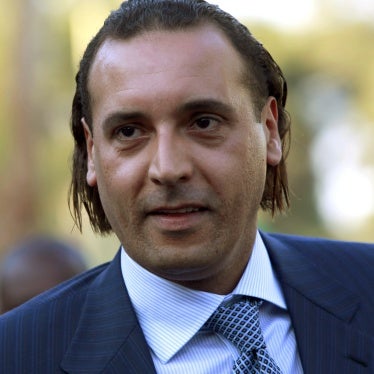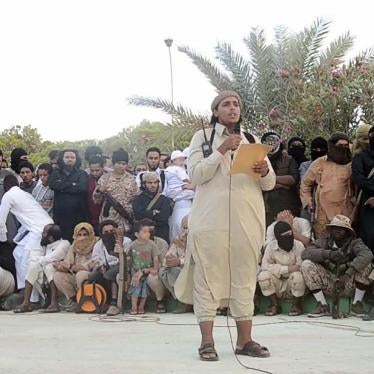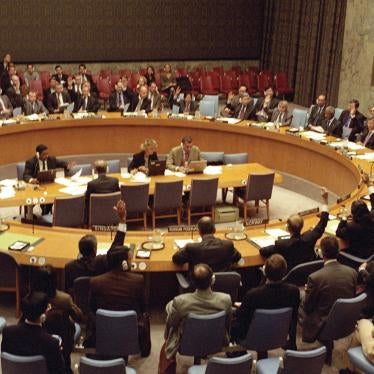(New York) – The Syrian government is unlawfully holding tens of thousands of political detainees solely on the basis of their peaceful activity, Human Rights Watch said today in opening a campaign to cast light on their fate. Many have been held for long periods and tortured.
The Human Rights Watch campaign, Inside the Black Hole, tells the individual stories of 21 Syrians who have been detained by the government since the start of the Syrian uprising in 2011. All have been detained solely for exercising their rights to free expression and peaceful assemblyor for providing medical care to people injured at protests and shelter to people displaced by the conflict. The government should drop charges against political detainees who are before the military field courts and the Counterterrorism Court set up in July 2012.
“Behind the awful brutality of the fighting in Syria is the unseen abuse of political detainees – arrested, tortured, and even killed for peacefully criticizing the government or helping people in need,” said Joe Stork, acting Middle East and North Africa director. “Arbitrary detention and torture have become business as usual for Syrian security forces.”
The systematic use of torture by the government is strong evidence of state policy which would constitute crimes against humanity, Human Rights Watch said. Concerned governments need to make clear that the Syrian government and those responsible for the abuse will ultimately face justice for their actions.
Government forces have arbitrarily arrested and tortured hospital staff who received wounded protesters, local businessmen who raised money to buy blankets for displaced people, and software developers who advocated free speech on the Internet. Most of the detainees have been men, but women and children have not been spared.
The authorities jail political detainees for months without charge, and torture, mistreat, and prevent them from communicating with their lawyers or families, leaving their families desperate to know what has happened to them.
In one case, agents believed to be from Air Force Intelligence arrested Yehia Shorbaji, 34, a construction worker, known in his hometown of Daraya as “the man with the roses” because he gave flowers to security forces during the early days of the uprising. Government officials have refused to give Shorbaji’s family any information about him or his brother Mohamed since they and three other activists in a group called Daraya Youth were arrested in September 2011. One of the five, Ghiyath Mattar, died in custody within days of his arrest.
In July 2012, Syria adopted an overly broad Counterterrorism Law that criminalizes almost all peaceful opposition activity. The government has used the new Counterterrorism Court and the longstanding military field courts to target activists and punish peaceful dissent. Both of these systems deny defendants basic fair trial rights. The charges in these courts are brought under the guise of security or countering armed opposition, but the allegations actually involve distributing humanitarian aid, participating in peaceful protests, and documenting human rights abuses.
On October 2, a trial of Mazen Darwish and four colleagues from the Syrian Center for Media and Freedom of Expression resumed before the Counterterrorism Court on charges of “publicizing terrorist acts.” The indictment against them, which Human Rights Watch reviewed, states that the charges are based on activities such as monitoring online news and publishing the names of the dead and disappeared. During the proceeding on October 2, the judge presiding over the case postponed the trial for the fourth consecutive time citing the security forces’ delay in responding to the court’s request for information.
Darwish and two colleagues, Hussein Gharir and Hani Zaitani, have been jailed since February 2012. Former detainees who had been held with the men said that authorities subjected them to torture and other ill-treatment. Two other colleagues have also been charged but released, pending trial.
Another featured case is of Bassel Khartabil, a Syrian of Palestinian parents who was arrested on March 15, 2012, in Damascus. A computer engineer, Khartabil founded Creative Commons Syria, a nonprofit organization that helped people legally share artistic and other work with free tools. “My life did not just change after Bassel’s arrest,” a relative told Human Rights Watch. “It literally froze in time.”
Officials provided his family with no information about where or why Khartabil was in custody until December 24, 2012, when they moved him from Sednaya Military Prison, where he had been tortured, to Adra Central Prison in Damascus. Khartabil is being tried before a military field court.
Former detainees told Human Rights Watch that security officials tortured them by forcing them into stress positions, abusing them sexually, including by rape and electric shock to the genitals, and beating them with batons, cables, metal rods, and wires. They described particular methods and devices like shabah, basat el-reeh, and dulab, whichSyrian guards and interrogators are known to use in detention facilities across the country.According to the Violations Documentation Center, a Syrian monitoring group, nearly 1,200 people are known to have died in detention.
Human Rights Watch has previously documented the locations of 27 detention facilities around Syria where security force members tortured civilians. The report identified the agencies and in many cases the commanders in charge of these facilities.
In addition to releasing all wrongfully detained people, the Syrian government should grant immediate and unhindered access for recognized international detention monitors to all official and unofficial detention facilities, Human Rights Watch said. Monitors should include people from the office of Lakhdar Brahimi, the joint special representative of the United Nations (UN) and the League of Arab States, and from the UN Commission of Inquiry on Syria.
Concerned governments should press Syrian authorities to release political prisoners and to allow monitors access to detention facilities. The governments should use diplomatic channels and targeted sanctions against those credibly implicated in serious human rights abuses, Human Rights Watch said.
Concerned governments should also support a UN Security Council referral of the situation in Syria to the International Criminal Court to investigate and prosecute those bearing the greatest responsibility for abuses in Syria.
Some armed opposition groups have also arbitrarily detained people, including journalists, humanitarian workers, and activists. In some cases opposition groups have executed detainees. Opposition groups should release all arbitrarily detained people in their custody and treat all detainees in conformity with international human rights standards.
“All governments and especially Security Council member countries should put the plight of these thousands of political detainees high on their agenda for diplomatic discussions,” Stork said. “Those with leverage with the government as well as with opposition forces should press for them to free everyone they are holding unlawfully.”








